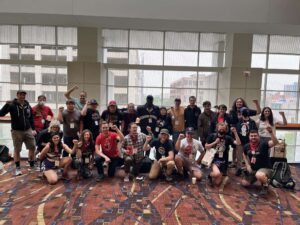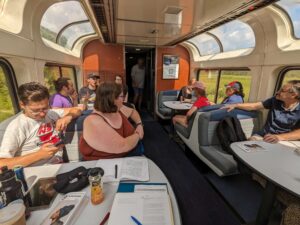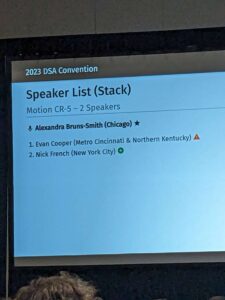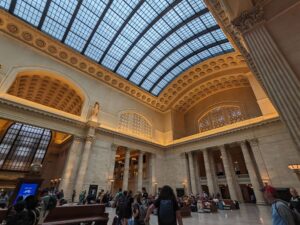
Group picture of TCDSA delegates
BY DEBRA KEEFER RAMAGE
I’ve known Sam for almost three years now. Even though electoral organizing is not my favorite thing or my highest priority, I thought his (and others) idea to start a Democratic Socialist Caucus (DSC) within the DFL was a good one, and I’ve been involved with that from the beginning. Sam is the chair of the DSC, which as it turned out never did get recognized by the DFL, so is operating independently for now.
Democratic Socialists of America (DSA) holds conventions every two years, in the first week of August in odd-numbered years. The 2021 convention was, so far, the only one held virtually, and it was somewhat successful, although lacking in many of the socializing, organization-building features. This year it was in Chicago, back to an in-person event.

Comrades on a train going there
The DSA deliberately kept the exact location of the convention private and the only media presence there was The Free Press doing interviews with delegates (and I cannot find anything they published even now, two weeks later). There is literally no news, except some adversarial “reporting” from World Socialist Web Site, and Jacobin’s interviews with NPC candidates on the eve of the convention. Even the national DSA has not published a report on it yet.
DSA chapters are expected to raise money to send their delegates to the convention. Twin Cities DSA held a fundraising party at the Black Hart of St. Paul, which raised enough to cover anything not covered by either delegates themselves or the national assistance fund.
Some delegates can handle their own travel expenses and can afford to share rooms in the hotel block reserved for the organization, but may need the chapter to pay their registration fee, which is not cheap. Some delegates need help with everything: registration, travel, lodging and other meals. I asked Sam if he thought our chapter and the national (both of which offer funding) did a good job this year, and he said yes, they did. No one was unable to go due to financial considerations.

Impressive tech at DSA convention
Although overall member numbers have declined, and a small handful of chapters have gone dormant, there are currently over 200 DSA chapters, including four in Minnesota, and all 50 states have at least one active chapter. Consequently this convention had over 2,000 delegates. Twin Cities DSA elected 22 delegates and two alternates, one of whom was Sam. One delegate was ill when convention time came around, so as the highest alternate, Sam was upgraded.
In the pre-Bernie days, and again in 2017, when the DSA convention was in Chicago, I used to sometimes attend as an observer. DSA no longer has an observer status, however. At those conventions there was a lot of free time, and delegations, including observers, alternates and friends recently made from other chapters, would often go out to dinner or bar crawling together in the evenings. Plenary sessions, too, had a side benefit of social networking. I asked Sam how that was at this more tightly controlled and serious version of convention. He said he did most of his socializing at the “smokers’ caucus” and in breaks at the hotel bar. Also a large part of our delegation and other nearby chapters took a train together, and so had a long opportunity to socialize and compare notes, both going and coming back.
Sam, like me, maybe even more so, is a Rules of Order geek. He was very impressed with the technology and methods used to keep this hugely contentious gathering on a comradely and rational basis as they struggled with big questions that could impact our very survival. To control motions, speakers and debate, as well as tally votes, an app called Open Slides was used. Sam is looking into getting this app for the DSC and eventually it could even find its way into DFL protocols.

Train station departure from Chicago
Serendipitous things happen at DSA conventions. One example: Minnesota DSA-ers met unofficially with some Florida comrades to discuss ways DSA could facilitate vulnerable people who needed to get out of Florida, by using the DSA Fund to help them relocate, and using our union connections to help them find jobs in Minnesota.
Sam sent a brief report by text to a Signal Chat of DSC and other activists right after returning home from the convention. Here is an excerpt, which sums up his take on the political alignments present, as well as the results of the leadership election:
“The convention was very competitive between competing caucuses and tendencies, with many closely divided questions, yet remained quite harmonious with very little ugly or embarrassing behavior out in the open, compared to the chaotic 2017 and 2019 conventions. The convention elected a ‘left wing majority’ although I’d only think of 2-3 of them as ‘ultras] with hardline positions like an immediate clean break with the Democratic party and total opposition to the party. It’s apparent to me that DSA’s membership has politically matured since the Bernie wave. So many of the 200-plus chapters are doing fantastic work that is overshadowed by the media focusing on conflicts rather than accomplishments.
“Any proposals that are antagonistic to working with Dems or running as Dems were defeated, although several items were adopted that continued to articulate DSA’s vision to take on ‘party-like’ qualities and independence from the Democratic party – their own voter lists and canvassing tools (i.e., not needing VAN), fundraising tools (not needing ActBlue), etc., so that candidates don’t need to depend on tools out of their control or influence.”
DSA may be a bit leaner than it was in 2019, but it is also more pragmatic, and equipped with the knowledge and tools to really get things done and set realistic priorities. And that is no plainer anywhere than in the Twin Cities, home to the fifth largest DSA chapter in the nation, and possibly soon to be home to the first socialist-aligned majority city council in a major U.S. city.























Here is the coverage from The Free Press: https://www.thefp.com/p/video-the-free-press-meets-democratic-socialists